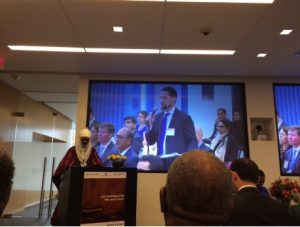Representatives from Azzad Asset Management, investment advisor to the Azzad Funds, joined senior officials from central banks, financial institutions, and regulators in Washington, DC for a symposium on Islamic finance organized by the World Bank and the Islamic Financial Services Board. Held in conjunction with the annual International Monetary Fund and World Bank governors meeting, the Oct. 6 event focused on ways to implement the 2016 United Nations Sustainable Development Goals using the tools of Islamic finance.

The conference, titled “Islamic Finance and the Sustainable Development Goals,” brought together representatives from Turkey, Malaysian, Saudi Arabia, Qatar, Sudan, Zambia, Indonesia, and Malaysia to forge ahead on implementing a sustainable development agenda in the coming years. As Islamic finance has expanded in recent years to represent approximately $2 trillion in assets globally, policymakers have looked to Islamic finance as a means of advancing the humanitarian goals of financial inclusion, income equality, and educational opportunity.
In 2015, the United Nations introduced the “Sustainable Development Goals” (SDGs), which include 17 goals to help emerging markets develop in a socially conscious way. These goals extend beyond poverty alleviation to also include measures like good health, quality education, gender equality, infrastructure, economic growth, climate action and reduced inequalities, among others. The SDGs bring to the fore the increasingly urgent need to find new and alternative financing solutions, like those offered by Islamic finance, to support these new directions and commitments for achieving the world’s socio-economic goals.
Held at the World Bank offices in Washington, DC, the conference included comments from HRH Muhammad Sanusi II, Emir of Kano, Nigeria, and Gloria Grandolini, World Bank Senior Director of the Finance & Markets Global Practice Group.
